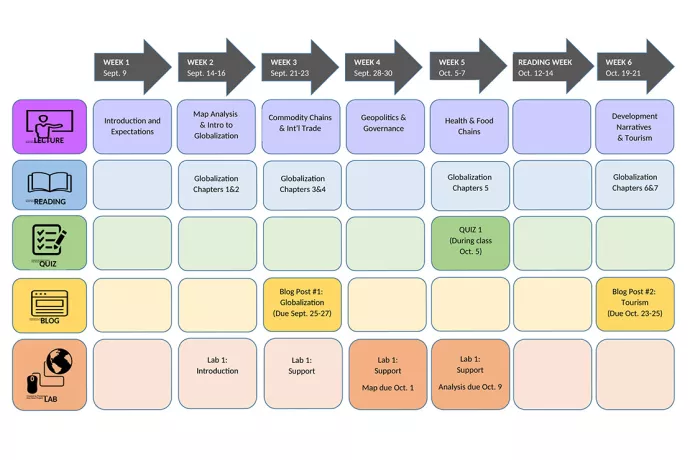
UTM faculty head to virtual ‘summer camp’ to prepare for fall term
Preparing to educate students remotely this fall is a serious undertaking, but the University of Toronto Mississauga has put a fun twist on the process by inviting faculty members take part in “summer camp.”
Over four days earlier this month, and again next month from Aug. 10-13, UTM is hosting online training to help instructors effectively design their courses and engage students as they gear up to teach in virtual classrooms—most for the first time—this September.
To add some levity to the experience, and lighten the heavy mood caused by the pandemic, the pedagogical training has been designed using visuals, language and formatting of summer camp. Three nature-themed branded videoconferencing backgrounds were created and shared with faculty members for download. Summer camp-style images, graphics and language are used to explain concepts. But most of all, plenty of time is carved out for show and tell, where participants can exchange ideas and learn from each other.
“What is most alluring to me about summer camp is the idea of making friends and connections. We wanted to replicate that in the training to allow everyone ample time to discuss strategies and tactics with their colleagues in order to make their courses impactful and engaging,” says Fiona Rawle, associate dean, undergraduate and associate professor, teaching stream in the Department of Biology.
Rawle co-developed the Summer Camp training with Ann Gagné, UTM’s educational developer, through the Teaching and Learning Collaboration, an initiative between the Office of the Vice-Dean, Teaching & Learning and the Robert Gillespie Academic Skills Centre. Also involved were Simone Laughton, head of library instructional technologies, and Matthew O’Reilly, multimedia and classroom technology specialist. The training is structured like a mini online course: faculty members participate in daily two-hour synchronous webinars, are assigned homework such as watching lecturettes (8-12 minute lectures), are given tests, and are advised of relevant resources on best practices in remote teaching.
“The goal was to provide faculty members with the students’ point of view to help them better understand how to guide their students and make the content and learning accessible and easy to navigate,” Gagné says.

The training covers a wide range of topics to help instructors optimize how they create their course shells on Quercus, UTM’s learning management system, including creating visual course maps that clearly reflect work expectations, and using a scaffolding technique whereby assignments are split into manageable chunks, with each one progressively building on prior knowledge.
At a time when we are all dealing with new pressures created by COVID-19, the sessions also address the principles and methods of trauma-informed teaching and following a pedagogy of kindness and care.
“We all need a heightened awareness of the additional stresses students, faculty and staff are facing right now,” Gagné says. “Trauma-informed practice is about being empathetic and creating a safe and supportive learning environment.”
Summer Camp training builds on several other one-off professional development sessions on remote education led by Rawle and Gagné on subjects such as dealing with difficult issues in the classroom, developing a just-in-time course syllabus, and designing an inclusive assessment with academic integrity and pedagogical rigour. By integrating all of these topics into a lighthearted and cooperative mini course format, Rawle hopes to demonstrate how community is key to success in the fall.
“Summer Camp is a reminder that our best resource is each other, and that we can come up with solutions together,” Rawle says.
Read more:
Showing Kindness: Biology professor strengthens human connections during uncertain times
‘A pedagogy of kindness’: U of T faculty find creative ways to support students, learning during COVID-19
